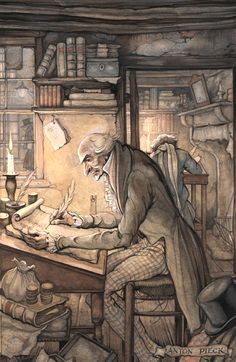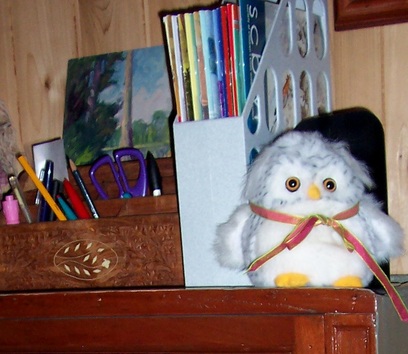 In author Terry Pratchett's Disc World series, dragons are real, as long as people believe in them. The stronger the belief, the more magnificent the dragon. In the series' first book, The Color of Magic, the main character is high above the ground, escaping on someone else's imagined dragon when he realizes doubting the dragon's existence could mean a long fall to the ground. An article I wrote called Never Stop Believing was recently published in the Society of Children's Book Writers and Illustrators Bulletin magazine. It was about perseverance and fighting doubt in your work. I don't think I've ever met an artist or writer who hasn't faced doubt. For some, it's a constant companion. Writers experience it when their first drafts are criticized by peers, their polished work rejected by agents and editors, and their published work picked on by negative reviewers. Yet, we keep on creating. It's who we are. Art grows inside of us and begs to be fulfilled. So we write our stories and craft our artworks and we try to believe they're worthy. That's where the dragons come in. I love the idea of a mighty beast as metaphor for our belief. The stronger our faith in our work, the more powerful the dragon. And it isn't just about our work, it's about believing in who we are, right now, no matter what we look like or what we've accomplished or how we compare to others. If we don't believe in ourselves, we cripple our abilities and potential. Imagine you're nestled behind a dragon's wings, flying high over your town. You've just finished your latest art or story and it's good, maybe better than good. You can't wait to show it to others. Some love it and some don't. You downplay the praise and focus on the criticism. Your dragon starts to fade and you're falling fast towards the ground. If we rely on others to confirm our art is worthy, we abandon the creative spirit inside of us. That spirit needs our faith to keep it flying high. So envision your dragon and feed it often. Grow it into something powerful and beautiful, just like you.
0 Comments
 Rejection. I do not like that word. It's right up there with Voldemort and Scrooge. Okay, so it doesn't shoot killing spells at baby wizards or sneer at starving orphans, but it does break our hearts. You spend hours perfecting your story or painting. Family and friends applaud your brilliance. Your teachers say it's ready to send out in the world. You submit it to a contest, publisher or art director and as you wait for their response, you try, yes you do, to keep hope from building in your heart. But it's there. That dream of hearing your work has been selected, it's won the prize. When it doesn't, it's hard not to feel defeated. Every time we submit our art to others for review, we face rejection. There can be only one winner. Maybe there are awards for second best and almost good enough. Everyone else is left wondering what the judges thought of their work. It's so easy to go straight from wondering if they liked it at all to thinking they hated it. Don't. Don't give the Scroogey thoughts in your head a voice. They lead to a slippery slope of doubting your work and your ability. Writers and artists have a natural urge to create. Unfortunately, it doesn't come with ego armor. We have to build that bit by bit, and we have to strengthen it often. Like Harry, Ron and Hermione, practice your shielding spells. Every book I write, is created with the hope that someday it will be published. That means submitting each and every one to the publishing world and facing rejection. Here's the thing about publishers: they're people, just like you and me, with different tastes. Some will throw my books in slush piles without a second glance. Some will like them, but not enough. Hopefully, one will love them enough to publish. Unless you hide your art in a closet, it will be viewed and judged by people, and not everyone will love it. I think that's a good thing. I don't want to live in a Voldemort world where everyone likes only Voldemort books and art. There's room in this world for all kinds of art. Yours will find the people who love it. Keep growing through critical feedback, embrace positive reviews and believe in your work. Don't let rejection defeat you.  Do friends ask for your opinion on their artwork or stories? Are you happy to oblige or do you scramble for excuses: I'd love to but my dog ate fifty-seven pages of my homework. Or sorry, we're leaving, right this minute for an emergency vacation. Then you hide out for the next few days hoping they'll ask someone else and forget they asked you. Rather than fumbling for excuses and hiding, it's best to be prepared. If you have the time, honor their request. Some day, you may need them to return the favor. We write stories and make art for ourselves, but most of us mean to share it when it's finished. If it's created as a class assignment, teachers and fellow students offer comments. But artists and storytellers don't stop producing when the last bell rings. The work you create outside of school needs support too. So its' a good idea to learn how to offer helpful, honest feedback without crushing someone's feelings. You may already know of the sandwich formula: Start your critique with a positive: Share what's working for you. What do you like about the piece? Even if it's something you'd normally groan at, take another look. Are there colors in the art that appeal? Is there a character in the story you find intriguing, even if it's just the main character's pet? Then address what isn't working. What would you add to enhance the work? What would you delete? What needs clarifying? Don't give them a list. Consider the person's skill level and offer a couple points you feel will help them grow. Like, "The painting has a lot going on. I really like what's happening here, but maybe you could tone things down a bit there," or "The plot is exciting but there's one or two twists I didn't understand." Finish with encouragement. Thank them for sharing their work. It's takes courage to expose art to others. You pour yourself into the work and risk potentially hurtful criticism when you ask peers to review it. So respect that and encourage creativity, not stifle it. And now a couple more thoughts. If a person comes to you who has never shared their work, offer mostly encouragement. Accepting criticism without the ego being bruised is a learned skill. It takes time. Then again, there will be people who have shared enough work to have learned to accept critical feedback and yet, they want only praise from you. They won't be open to helpful criticism no matter how sensitively you give it. So it helps to ask the presenter what they'd like from you in the way of feedback before you begin. And when you encounter people who aren't interested in your advice, save your breath. Becoming good reviewers is a skill that benefits others, helps you see mistakes in your own work and prepares you for the future no matter what path your art takes. As artists and writers, you'll value the relationships you build with others through critiquing and it will grow your work and your mind in unexpected ways. A friend recently shared her disappointment over a loved one's lackluster response to a piece of her writing published in a literary journal. I understand her angst. A few years ago, I shared a story I was very proud of with friends and I was bewildered by their reaction. They seemed to have a hard time finishing the story, as if they were bored. Later, when that story won a contest, they asked, "what story was that?" They didn't even remember it.
My writer friend's experience made me wonder why normally kind, considerate people who clearly love us, respond insensitively to our writing. I tried to sit where they sat when they read those stories. First, none of them are writers. They have no idea how much a writer sweats over a piece. They can't envision the excitement at the start of a story, the anxiety waiting for feedback when it's finished and the grueling hours of revision. They haven't watched their email or snail mail for responses to submissions, cried over rejections and squealed when they read: We'd like to buy your story. When non-writers read our work, they compare it to polished, published pieces. And not just any published piece. People read discriminately. They put down what they don't enjoy and tastes vary widely. I have friends who read nothing but non fiction, others who favor only one genre. Most of my friends are older and have no reason to read children's books. So, I imagine when I handed them a story meant for ages eight to twelve, they were also bewildered. How could they connect to a twelve-year-old protagonist's point of view or care that her conflict was successfully resolved in 750 words? I don't share my writing with non-writers anymore unless someone asks (except for my husband, bless him!). It's kinder for all concerned. I do share my successes but I've tempered my expectations. Only writers can fully relate to this journey. In April I attended a workshop led by author and writing coach extraordinaire, Joyce Sweeney. The workshop focused on character but Joyce also critiqued first pages. Since many attend summer conferences where first pages are often reviewed, I thought I'd share what I learned from Joyce about that all-important start to a book.
This is my fifth year dedicated to learning to write and beginnings still feel like my nemesis. I revisit them repeatedly, experience "aha" moments when I think I've found the perfect opening only to see it dashed in critique. How do you accomplish all that's required in two-hundred and fifty words? Readers need to meet the protaganist and it isn't a casual introduction. They want to know their personality, age, their goal and conflict, where they live and when. They might also meet secondary characters. They'll need to know their relationship to the main character and what distinquishes them. For that reason, I try to keep the characters on the first page to a minimum. You don't want readers scratching their heads over who's who. On top of all that, the opening reveals the event that changes everything for the MC, the moment that sets the story in motion. That moment might be your HOOK! (yes, it is spoken in capitals. With an exclamation mark). Writers learn early about the need to snatch readers and reel them in. Huge units of brain power are burned trying to create irresistible openings. You have one, maybe two paragraphs to convince readers to buy your book. So, you promise thrills or chills or mind-shifting worlds. Which brings me to the first new tidbit I gleamed from Joyce's feedback: Genre should be evident from the start. If you're writing a ghost story, introduce spooky; if it's dystopia, show us the altered world; if contemporary, place us in the now. This is something I've ignored. I focused on character, conflict and setting, expecting readers to discover genre on the next pages. It's seems obvious now . . . if I'm expecting sci-fi and I find none on the first page, why would I read the book? The second discovery I made at the workshop was about character introduction. Readers need to relate to the main character, even want to be the character. So Joyce advised against showing their big flaw on the first page. The example she read opened with a protagonist who vomited when she was nervous . . . and she did it on the first page. It was a well-written scene but would you turn that page? You want the reader to like/admire/feel-compelled-to-follow the character before you introduce flaws that make them gag on the chocolate they're munching. First page reviews at conferences and workshops offer authors professional feedback. Eventually, your book will be submitted to agents and publishers and the industry is too overworked to read past a manuscript's unimpressive start. In my opinion, even people who choose non-traditional publishing benefit from first page critiques. We all want the same thing . . . to write books readers enjoy. So, I'll keep learning what I can about these vexing beginnings. Do they trouble you too? What advice has helped you improve them?  That's a rain tree in bloom. In another couple weeks the yellow blossoms will morph into papery rose-colored seed pods, followed by an invasion of rain tree, seed-loving insects called Jadera bugs or soapberry bugs. The rain trees' brilliant show is one more sign Florida's easing out of summer. But I digress. I should be writing about my mentorship. Correction. I should be working on the second hundred pages of my novel. I'd like to blame this lethargy on Monday. Truth is, I'm tiptoeing around my writer self, leery of undoing the flimsy bandaid that's holding her together. Caroline Leavitt responded to the first ninety pages of my book with constructive criticism and a dollop of praise. She asked questions that drove me deeper into the story, addressed weaknesses in the plot and undeveloped characters, and encouraged me to ask questions. I digested the review and a few days later I responded to Caroline with more questions and some clarifying notes about plot and character motivation. So far, so good. Sure, hearing I started the story too early (meaning chapters one and two were trash) hurt. But I was feeling challenged and motivated and the story was growing. Then, I got Caroline's response to my response. She liked some of the new plotlines and character development and she says this is a great story . . . at heart. Who doesn't want to hear their story's great? It's the caveat that worried me. That along with the rest of the comments that felt like they wiped out the other eight chapters I sent. It's amazing how fast the thrill of seeing ninety pages in print turns into the agony of imagining them shredded. I spent four days in a torrent, my brain spinning around and around the issues with no results. Yesterday, my brain shut down and I'm leaving it be. In the meantime, my story's stopped and I wonder, was this mentorship a mistake? Maybe I'm not ready for this level of criticism. I've only been writing for four years and my education's spotty. Maybe, I don't know enough to understand what Caroline's trying to teach me. Trusting someone you've only just met with your book is hard. No matter how much you respect the person who recommended them and how shiny their credentials. When they ask you to put aside your doubts and believe in their instincts, it feels like jumping without a parachute. If their advice conflicts with what you've learned, you need a super hero's courage to jump from the plane. I've never worn a cape. Right now, I'm hiding in the bowels of the aircraft where no one can find me. |
AuthorI write middle grade and young adult books with a magical twist, and I'm represented by the fabulous Leslie Zampetti at Open Book Literary. Writer Websites
Augusta Scattergood Maggie Stiefvater Rob Sanders Fred Koehler JC Kato Sarah Aronson Kelly Barnhill Linda Urban Kate DiCamillo Jacqueline Woodson Helpful Links SCBWI Agent Query Lorin Oberweger - Freelance Editor Search BlogArchives
May 2020
Categories
All
|
 RSS Feed
RSS Feed
